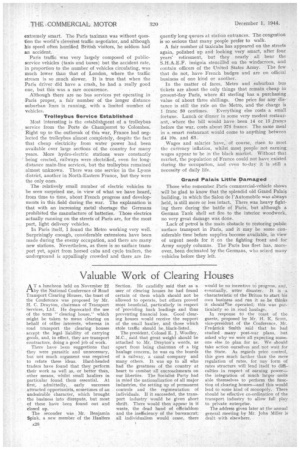Valuable Work of Clearing Houses
Page 30

If you've noticed an error in this article please click here to report it so we can fix it.
A T a luncheon held on November 22 tisby the National Conference of Road Transport Clearing Houses, the toast of the Conference was proposed by Mr. H. C. Drayton. chairman of Transport Services, Ltd. He deprecated the use of the term "clearing house," which might be taken to mean clearing on behalf of other interests, whereas in road transport the clearing houses accept the legal liability of carrying goods, and, in effect, they are transport contractors, doing a good job of work.
There have been suggestions that they were parasitic and unnecessary, but not much argument was required to refute these ideas. Hard-headed traders have found that they perform their work as well as, or better than, other means, whilst small hauliers in particular found them essential. At first, admittedly, early successes attracted opportunists, sometimes of an undesirable character, which brought the business into disrepute, but most of these have been found out and closed up.
The seconder was Mr. Benjamin Spink, a new member of the Hauliers
Section. He candidly said that as a user of clearing houses he had found certain of them which should not be allowed to operate, but others proved most beneficial, particularly in respect of "providing back loadings and thus preventing financial loss. Good clearing houses would receive the support of the small haulier, and those which stole traffic should he black-listed.
The president, Colonel E. J. Woolley. MC., said that great weight should be attached to Mr. Drayton's words, as apart from being chairman of a big haulage concern, he was on the boards of a railway, a canal company and many others. It was up to all who had the greatness of the country at heart to combat all encroachments on our liberties. The Socialist Party had in mind the nationalization of all major industries, the setting up of permanent controls and the regimentation of individuals. If it succeeded, the transport industry would be given short shrift. There would then appear in it waste, the dead hand of officialdom and the inefficiency of the bureaucrat; all individualism would cease, there would be no incentive to progress, and, eventually, utter disaster. It is a characteristic of the Briton to start his own business and run it as he thinks it shoulebe operated; this was particularly so in road haulage.
In response to the toast of the guests, proposed by Mr. H. K. Scott, vice-president of the Conference, Mr. Frederick Smith said that he had studied many post-war plans, but asked why we were all expecting someone else to plan for us. We should take action ourselves and not wait for the State. As regards price control, this goes much farther than the mere regulation of rates, for any form of rates structure will lend itself to difficulties in respect of earning power— the integration of much larger units able themselves to perform the function of clearing houses—and this would lead to some kind of monopoly. There should be effective co-ordination of the transport industry to allow full play to private enterprise.
The address given later at the annual general meeting by Mr. John Miller is dealt with elsewhere.




















































